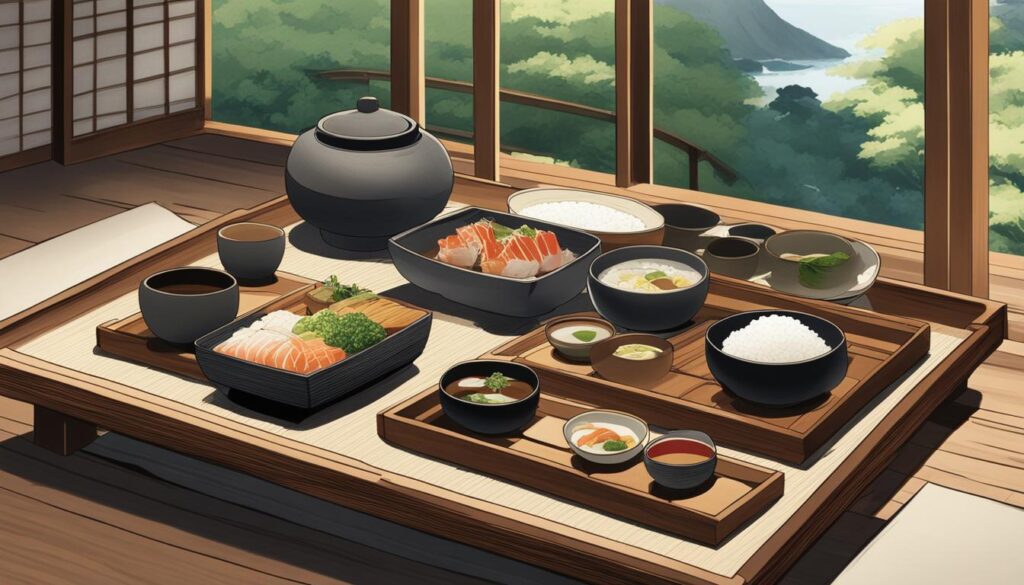Welcome to our quick translation guide on how to say “breakfast” in Japanese. In this article, we’ll explore the meaning, grammar, pronunciation, and cultural usage of the Japanese word for breakfast. Whether you’re learning the language or planning a trip to Japan, understanding breakfast vocabulary can enhance your cultural experience and help you navigate menus more confidently.
When it comes to breakfast in Japanese, the word you need to know is “朝食” (Choushoku). It is pronounced as “Chou-sho-ku.” This term encompasses the morning meal and represents the cultural significance of starting the day with a nutritious and balanced meal.
If you want to express your desire for breakfast, you can say “朝食が欲しいです” (Choushoku ga hoshii desu), which translates to “I want breakfast.” Remember to use this phrase in appropriate contexts when discussing your breakfast preferences or ordering food.
An alternative way to inquire about someone else’s breakfast is by asking “朝食を食べましたか?” (Choushoku wo tabemashita ka?), meaning “Have you eaten breakfast?” This can serve as an opening for conversation or to show concern for someone’s well-being.
While “朝食” (Choushoku) is the common term, some people in Japan might refer to breakfast as “モーニング” (Morningu). However, it’s important to note that the specific dishes and foods enjoyed for breakfast in Japan can vary.
Common Breakfast Foods in Japanese Cuisine
A traditional Japanese breakfast is a delightful culinary experience that reflects the rich culture and traditions of Japan. It typically consists of a combination of rice, miso soup, grilled fish, and an array of mouthwatering side dishes. This harmonious medley of flavors and textures ensures a balanced start to your day.
Alongside the staple elements, there are several other popular breakfast foods in Japan that showcase the diversity of the country’s cuisine. These include:
- Tamago: Cooked eggs in various forms, such as scrambled, boiled, or rolled omelets.
- Natto: Fermented soybeans known for their unique flavor and sticky texture.
- Nori: Thin, dried seaweed sheets often used as a garnish or wrapped around rice balls.
- Tsukemono: Assorted pickled vegetables that add a tangy and refreshing element to the meal.
- Tofu: Soft and creamy soybean curd that can be enjoyed plain or seasoned with various sauces.
Japanese breakfasts are renowned for their focus on freshness, simplicity, and nutritional balance. The combination of protein from fish, fiber from rice and vegetables, and the probiotics found in fermented foods like miso soup and natto, contribute to a healthy meal to kickstart your day.
It’s worth noting that regional variations of breakfast dishes can be found throughout Japan, with different prefectures showcasing their own specialties. Exploring these regional delights allows you to embark on a gastronomic adventure and dive deeper into Japan’s culinary heritage.
So, whether you’re indulging in a traditional breakfast spread or savoring the unique flavors of regional delicacies, Japanese breakfast foods offer a delightful and healthy way to start your day.
Phrases for Ordering Breakfast in Japanese
When visiting a Japanese restaurant for breakfast, it’s helpful to familiarize yourself with a few key phrases to effectively communicate your order. Here are some useful phrases:
“朝食をお願いします” (Choushoku wo onegaishimasu) – Please give me breakfast.
“このメニューをください” (Kono menyuu wo kudasai) – Please give me this menu.
“お水をいただけますか?” (Omizu wo itadakemasu ka?) – Can I have some water, please?
“お勘定お願いします” (Okanjou onegaishimasu) – Can I have the bill, please?
Remember to pronounce these phrases correctly to ensure effective communication with the restaurant staff.
Cultural Notes on Breakfast in Japan

In Japan, breakfast holds great significance as it is considered an important meal to fuel the body for the day ahead. Japanese breakfast customs and traditions reflect the country’s values and cultural practices. Here are some key insights into the etiquette and customs associated with breakfast in Japan:
Traditional Japanese breakfasts are known for their meticulous preparation and presentation. However, due to busy lifestyles, many people opt for simpler options like toast or cereal on weekdays. This allows them to enjoy a quick and convenient meal before heading out for work or school.
Eating breakfast together as a family is highly valued in Japanese culture. It is seen as an opportunity to strengthen family bonds and foster communication. Sharing a meal in the morning sets a positive tone for the day and allows family members to connect before starting their respective activities.
While breakfast can be enjoyed at home, many people also frequent local cafes for a leisurely start to their day. In fact, breakfast sets and menus are commonly offered in Japanese cafes, allowing individuals to enjoy a variety of dishes and flavors.
In Japan, it is considered polite and respectful to finish all the food on your plate during breakfast. This practice demonstrates gratitude and appreciation for the meal that has been prepared. It is advisable to portion your food mindfully, ensuring that you can finish everything you take.
To experience the richness of Japanese breakfast customs and traditions, consider staying at a traditional inn called a ryokan. These establishments offer authentic Japanese breakfasts that showcase a wide range of traditional dishes. The attention to detail in the preparation and presentation of the food is awe-inspiring and provides a glimpse into the cultural significance of breakfast in Japan.
By embracing the Japanese breakfast culture and etiquette, you can gain a deeper understanding of the country’s traditions and values. It is an opportunity to appreciate the art of food and experience the connection between culinary practices and societal norms.
Exploring Japanese Breakfast Culture
To fully experience the Japanese breakfast culture, immerse yourself in the traditional by staying at a ryokan. These traditional inns offer an authentic Japanese breakfast that will give you a true taste of the country’s morning culinary customs. From the moment you wake up, you’ll be treated to a meticulously prepared meal that showcases the flavors, ingredients, and presentation that are synonymous with Japanese cuisine.
If staying at a ryokan isn’t an option, you can still indulge in a traditional Japanese breakfast by visiting local cafes or restaurants that specialize in serving this morning feast. Don’t be afraid to step out of your comfort zone and try new foods and flavors. Japanese breakfasts often include unique dishes such as grilled fish and fermented soybeans, which may be a departure from your usual morning fare. Embrace the opportunity to explore and expand your palate.
During your Japanese breakfast experience, take the time to appreciate the meticulous attention to detail and the aesthetic beauty that is inherent in Japanese cuisine. Each dish is carefully crafted and arranged to create a visually stunning presentation. This emphasis on beauty is deeply rooted in Japanese culture and reflects the appreciation for elegance, harmony, and balance.
By immersing yourself in the Japanese breakfast culture, you will gain a deeper understanding of the country and its traditions. Whether you’re trying a traditional breakfast at a ryokan or indulging in local culinary delights, this cultural immersion will provide you with an authentic Japanese breakfast experience that will leave a lasting impression.

